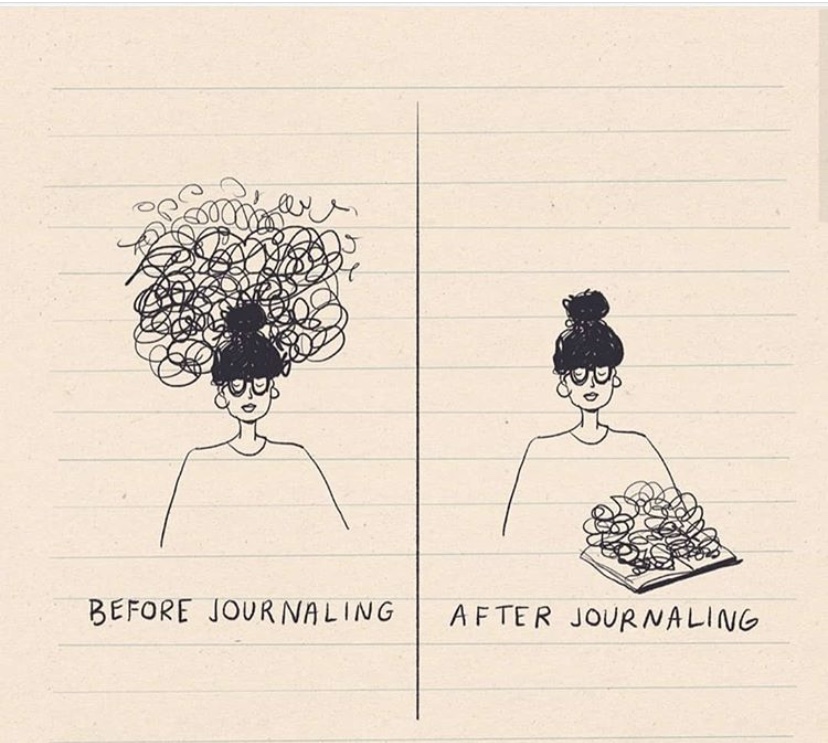By: Jaclyn Rink, MSCP, LLP
Psychology was born on the basis of catharsis. Catharsis means that when we release emotions through the form of expression, we experience symptom relief. You’ve probably heard of the term “talk therapy” (which is just catharsis disguised under a more simple name), and we can all relate to the relief that is experienced by talking to someone about our feelings or the stressors in our lives. However, this cathartic expression can come in any form: verbal, written, movement, music, etc. During the process of catharsis, our emotion becomes acknowledged, allowing us to eventually release it and move forward. Think of it as letting go of something heavy you've been holding on to. Metaphorically, you are removing that thought or feeling from your brain, and putting it somewhere else (onto paper, into your painting, etc.)
The process of journaling allows us to experience catharsis by encouraging acceptance of our feelings, organizing our thoughts, distracting us from the current stressor, and helps us to practice mindfulness and reflection. It involves only yourself, it's free, and it doesn't even necessarily require a pen and paper. When we journal, we often discover new things about ourselves, our feelings, and our thoughts, as the paper offers us a safe haven to be fully transparent and honest with ourselves. Journaling allows us to think freely, without judgment, and express ourselves in a vulnerable way.

Journaling is a habit that is most effective when used in the moment or flexibly scheduled into your routine, especially if you struggle with ongoing feelings of anxiety, depression, or stress. I often encourage my patients to journal in between our sessions, or during particularly stressful times in their lives. It is a simple practice that offers a big reward! Don't know how to start? See below for a few tips.
- Your journal doesn't have to be on paper! Type up a word document, use 'notes' on your phone, download an app, or talk into an audio recorder. Any form works.
- Write anytime of the day. It doesn't need to be in the morning or at night (contrary to popular belief). Just be sure to set aside a little time each day to make it a go-to practice.
- Take your journal with you; this allows you to record in the moment or jot down notes for things you may want to write about later.
- Talk to someone: Some people find it difficult to journal because it feels like they are talking to themselves. Instead, try writing as if you’re talking to someone: your younger self, your future self, someone who is no longer with us, to someone you admire, to someone who has wronged you.
- Periodically reflect on your previous passages. You may start to notice that things you wrote about were more manageable than they felt in that moment. Maybe the future you came up with solutions that would be helpful to employ next time you feel similarly. How have your thoughts and feelings changed? How have you grown?
- When you don't know what to write about, write about gratitude.
- Journaling isn't all about feelings. Use it for brainstorming possible solutions, list things you would like to accomplish, identify things that you hope for in your future, or write down some things you love about yourself.
- Get creative; add some personal photos, doodle on your pages etc. Your journal should be uniquely you.
- Was ELA your least favorite subject in school? Don’t worry about your grammar, spelling, fragmented thoughts etc. while journaling. No one is grading it. Let go of your expectations and try to enjoy the creative process.
- If you’re a lover of affirmations and quotes, these can be helpful topics for your entries. Pick a random quote and respond to it by asking yourself the following questions: how does this quote make me feel? How can I apply it to my life? Does it need some adjusting to fit me better? You may just discover a new, helpful, and more personalized daily affirmation.
If you’re still feeling stuck, there are many varieties of daily journals available for purchase with pre-recorded daily prompts.
Happy Writing!


